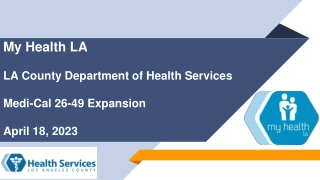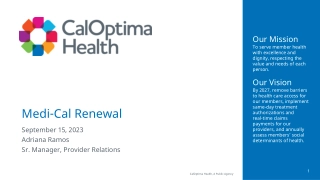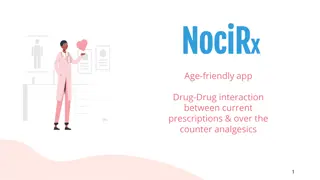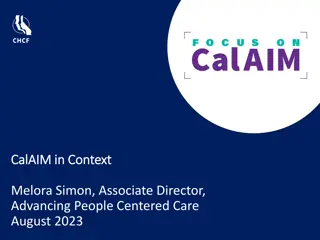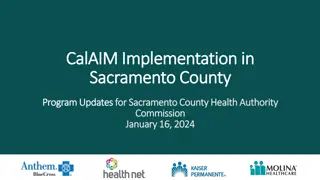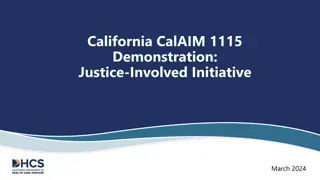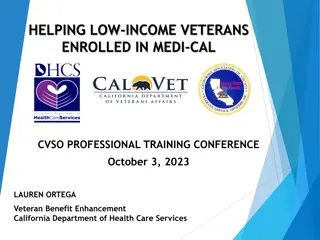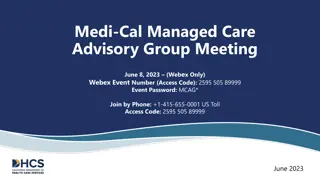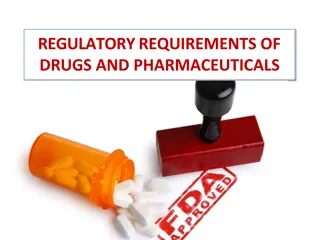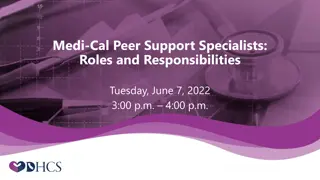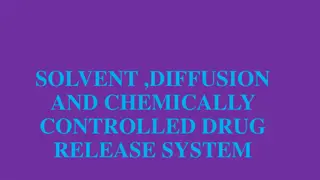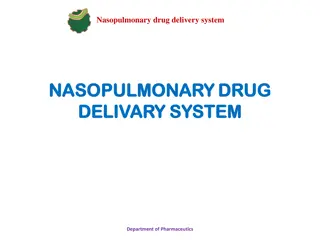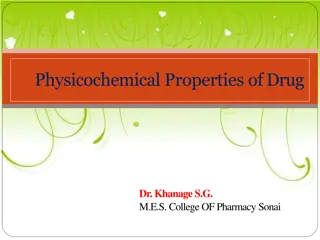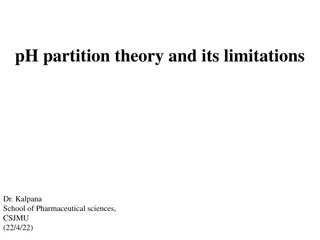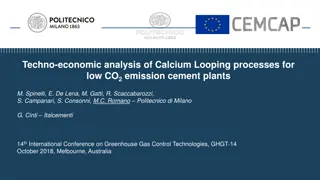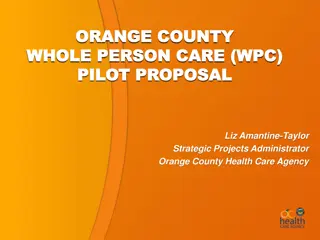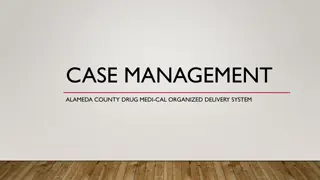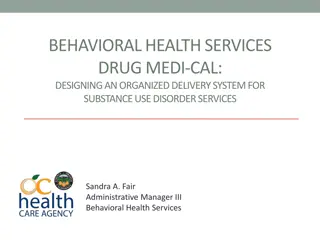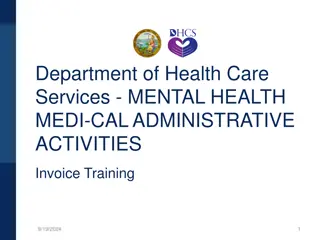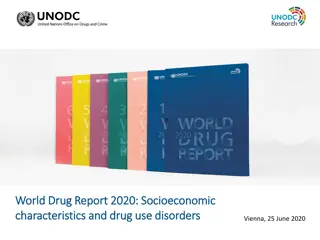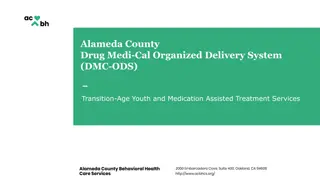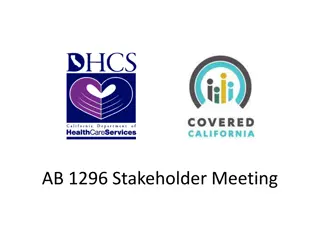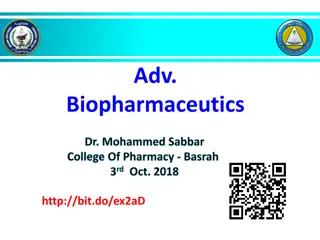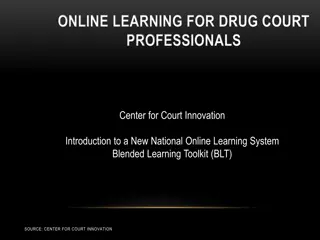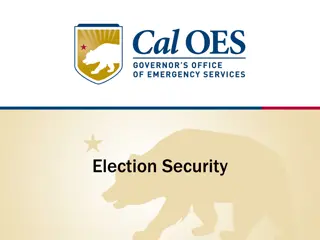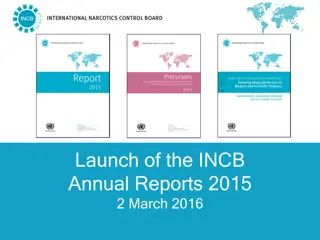My Health LA Medi-Cal Expansion Update 2023
Learn about the upcoming Medi-Cal Expansion affecting MHLA participants aged 26-49. Important timeline, impact, enrollment details, and contract changes. Prepare for changes before January 1, 2024.
0 views • 34 slides
Medi-Cal Renewal
Renew your Medi-Cal coverage with CalOptima Health. Follow these steps to update information, create an online account, check mail, and complete the renewal form. Find member and community resources for assistance.
2 views • 13 slides
Age-Friendly App: Managing Drug-Drug Interactions Between Prescriptions and OTC Analgesics
The Age-Friendly app addresses the crucial issue of drug-drug interactions between current prescriptions and over-the-counter analgesics in the geriatric population. With a significant percentage of OTC sales attributed to older adults, there is an increased risk of adverse drug events due to polyph
1 views • 25 slides
Challenges in Navigating the Medi-Cal System - Insights and Experiences
Medi-Cal coverage in California is comprehensive but complex to navigate, leading to difficulties in accessing needed care, especially for individuals with complex needs. The system includes mental health plans, managed care options, Medicare, and substance use services. Coordination challenges and
5 views • 17 slides
CalAIM Implementation Updates in Sacramento County: Enhancing Medi-Cal Managed Care and Community Supports
CalAIM implementation in Sacramento County includes collaborative efforts in enhancing Medi-Cal Managed Care Plans (MCP) and implementing services like Enhanced Care Management (ECM) and Community Supports (CS). The joint MCP collaboration activities involve standing workgroups, roundtables, streaml
0 views • 18 slides
California CalAIM Justice-Involved Initiative Overview
California's CalAIM Justice-Involved Initiative focuses on supporting individuals involved in the justice system by providing key services pre-release, enrolling them in Medi-Cal coverage, and connecting them with essential behavioral health and social service providers for successful reentry. The i
0 views • 15 slides
Support for Low-Income Veterans Enrolled in Medi-Cal
The Medi-Cal program in California, the state's Medicaid program, provides coverage for over 16 million individuals, including children, pregnant women, seniors, and low-income adults. This program has seen a significant increase in enrollment since the implementation of the Affordable Care Act. Spe
0 views • 11 slides
Medi-Cal Managed Care Advisory Group Meeting - June 8, 2023
The Medi-Cal Managed Care Advisory Group Meeting scheduled for June 8, 2023, will focus on various topics including renewals/redeterminations, 2024 transition policy guide, transportation benefits, community health workers, and more. The meeting will feature key speakers providing insights and updat
0 views • 82 slides
Understanding Regulatory Requirements of Drugs and Pharmaceuticals
Drug regulation involves controlling drug use through international agreement authorities like the FDA, EMA, and PMDA. The FDA plays a crucial role in drug evaluation and research, biologic evaluation, devices, and food safety. There are various types of applications for drug approval, along with a
0 views • 28 slides
Peer Support Specialists: Roles and Responsibilities in Medi-Cal
Medi-Cal is preparing for the end of the COVID-19 Public Health Emergency and urging beneficiaries to update their contact information to maintain coverage. DHCS is introducing peer support specialist services as an optional behavioral health benefit in California from July 1, 2022, onwards. Become
2 views • 36 slides
Polymeric Controlled Drug Delivery Systems
Polymeric controlled drug delivery systems play a crucial role in regulating drug release through diffusion, solvent penetration, and chemical mechanisms. These systems include diffusion-controlled, solvent-controlled, and chemically-controlled devices, each operating based on specific principles. S
0 views • 33 slides
Renal Pharmacology: Drug Excretion and Renal Clearance Questions
This comprehensive set of questions and answers covers topics related to drug excretion and renal pharmacology. It includes information on glomerular filtration, drug excretion mechanisms, dosage adjustments in renal impairment, factors influencing drug excretion, and the effects of long-term NSAID
0 views • 55 slides
Understanding Nasopulmonary Drug Delivery System
Nasopulmonary drug delivery system, utilizing the nasal route for drug administration, offers advantages such as hepatic first-pass metabolism avoidance and rapid drug absorption. This system is beneficial for pharmacologically active compounds with poor stability in gastrointestinal fluids. While i
0 views • 35 slides
Understanding Physicochemical Properties of Drugs
The physicochemical properties of drugs play a crucial role in their pharmacological effects. These properties include physical and chemical characteristics that influence interactions with biomolecules. Solubility, partition coefficient, and dissociation constant are key factors affecting drug beha
1 views • 46 slides
Understanding Formulary Systems in Healthcare
A formulary is a dynamic list of medications curated by healthcare professionals to guide drug selection based on efficacy, safety, cost, and patient acceptability. It plays a vital role in promoting evidence-based and cost-effective drug therapy, improving communication between prescribers and phar
0 views • 17 slides
Ways to Stay Drug Free: Lessons for Teens and Families
Understanding the reasons behind drug usage among teens, this lesson provides valuable resources and strategies to stay drug-free. It emphasizes the importance of making healthy decisions and offers alternatives to drug use. Additionally, it highlights the significance of saying no to drugs, provide
0 views • 17 slides
Understanding the Hatch-Waxman Act: Promoting Affordable Generic Drugs
The Hatch-Waxman Act, also known as The Drug Price Competition and Patent Term Restoration Act, was enacted in 1984 to amend patent laws and the Federal Food, Drug, and Cosmetic Act. It aims to reduce costs associated with generic drug approval, allow early experimental use, compensate branded drug
0 views • 49 slides
Understanding Biopharmaceutics: pH Partition Theory and Drug Absorption
Biopharmaceutics explores how drug properties and administration methods impact drug absorption. Factors affecting oral absorption include membrane physiology and drug partitioning based on pH levels. The pH partition theory, explained by Brodie et al., highlights the role of drug lipid solubility a
0 views • 9 slides
Importance of In-Vitro Dissolution Testing in Drug Assessment
In drug development, in-vitro dissolution testing plays a crucial role in evaluating drug release from tablets when in-vivo bioavailability studies are limited. By ensuring drug release is close to 100% and uniform batch to batch, these tests help assess drug availability and effectiveness. Regulato
11 views • 10 slides
Understanding Pharmacodynamics: Potency and Efficacy
Pharmacodynamics explores how drugs interact with receptors in the body, affecting the magnitude of drug effects based on concentration. Graded dose-response relationships, potency, and efficacy play key roles in determining drug efficiency. Potency reflects the amount of drug needed for a specific
0 views • 21 slides
Understanding Quantitative Aspects of Drug Action
Explore the quantitative aspects of drug action, including drug receptor binding, concentration binding curves, dose-response curves, and types of antagonism. Learn to relate drug concentration to receptor binding capacity and response produced. Discover how concentration binding curves and dose-res
0 views • 29 slides
Techno-Economic Analysis of Calcium Looping Processes for Low CO2 Emission Cement Plants
This study explores the application of Calcium Looping (CaL) processes in cement plants to reduce CO2 emissions. The process involves using CaO as a sorbent to capture CO2 from flue gas, with the potential for integration at different points in the cement production process. The Tail-end CaL configu
3 views • 14 slides
Orange County Whole Person Care Pilot Proposal Summary
Orange County Health Care Agency's Liz Amantine-Taylor presents the Medi-Cal 2020 waivers that include the Whole Person Care program. This program focuses on enhancing care quality, access, and efficiency by coordinating health, behavioral health, and social services for vulnerable Medi-Cal benefici
0 views • 11 slides
Innovative Hygienic Solution for Healthcare Facilities: Introducing Medi-ShowerTM
Multi-Shower GB has developed the award-winning Medi-Shower, a unique anti-microbial showering system designed for healthcare facilities. Featuring color-coded Medi-Flush inserts, quarterly maintenance, and continual protection from bacteria, Medi-Shower provides a comprehensive solution to address
0 views • 11 slides
Comprehensive Overview of Alameda County Drug Medi-Cal Organized Delivery System Case Management
Comprehensive overview of the Alameda County Drug Medi-Cal Organized Delivery System's case management services, focusing on assisting beneficiaries in accessing necessary medical, educational, social, and community services. It includes details on care coordination, service coordination, goal orien
0 views • 17 slides
Designing an Organized Substance Use Disorder Service Delivery System
This project aims to enhance Substance Use Disorder (SUD) services provided through Drug Medi-Cal (DMC) in California by offering an organized delivery system. The 5-year pilot project offers expanded services to individuals with SUD, promoting treatment access and sustained recovery. Factors such a
0 views • 13 slides
Mental Health Medi-Cal Administrative Activities Invoice Training Overview
This training covers the essential components of Mental Health Medi-Cal Administrative Activities Invoice, including learning objectives, schedule details, purpose, source data requirements, documentation, and review processes. Participants will gain a thorough understanding of reporting time, staff
0 views • 31 slides
Impact of Socioeconomic Conditions on Drug Use Disorders: Insights from World Drug Report 2020
The World Drug Report 2020 highlights the strong correlation between socioeconomic factors and drug use disorders. Studies reveal that communities facing poverty, violence, and social inequality are at a higher risk of drug overdoses and addiction. Factors like income inequality, lack of social capi
1 views • 17 slides
Analysis of 2019 Cal MediConnect Rapid Cycle Polling Project Findings
The findings from the Cal MediConnect Rapid Cycle Polling Project conducted in 2019 focused on comparing the experiences of Cal MediConnect (CMC) enrollees by county, race, language, and disability across different characteristics such as language and need for Long-Term Services and Supports (LTSS).
0 views • 104 slides
Understanding Targeted Clinical Investigation in Pharmacovigilance
Targeted clinical investigation plays a crucial role in pharmacovigilance by further evaluating significant risks identified in pre-approval clinical trials. This involves conducting pharmacokinetic and pharmacodynamic studies, genetic testing, interaction studies, and large simplified trials to ass
0 views • 12 slides
Alameda County DMC-ODS Transitional Age Youth Services Overview
Alameda County Drug Medi-Cal Organized Delivery System (DMC-ODS) offers services for Transition-Age Youth (TAY) including medication-assisted treatment. Eligibility includes all Medi-Cal beneficiaries and specific clients like undocumented individuals ineligible for Medi-Cal. TAY are aged 16-24 and
0 views • 25 slides
Dementia Cal MediConnect Project Overview
The Dementia Cal MediConnect Project, led by Debra Cherry, PhD, aims to create dementia-capable systems of care by improving patient detection and support for caregivers. The project is funded by various organizations and involves key components such as advocacy, care manager training, and health pl
0 views • 23 slides
Enhancing Medi-Cal and Covered California Transition Processes
Stakeholder meeting to discuss the seamless transfer of individuals between Medi-Cal and Covered California programs when losing coverage, seeking feedback on process development, leveraging technology for data sharing, and ensuring minimal impact on beneficiaries. Initiatives include Transfer of Co
0 views • 14 slides
Advances in Ophthalmic Drug Delivery Systems
This content explores various advanced ophthalmic drug delivery systems including erodible ophthalmic inserts, soluble ocular drug inserts, new ophthalmic drug delivery systems, and bioadhesive ophthalmic drug inserts. These innovative systems aim to provide accurate dosing, prolonged drug release,
0 views • 8 slides
Innovative Online Learning for Drug Court Professionals
Center for Court Innovation has introduced a new National Drug Court Online Learning System aimed at assisting drug court professionals. This system offers free access to web-based training, expert video lessons, virtual site visits to drug treatment courts, practitioner interviews, and a resource l
0 views • 8 slides
Understanding Medi-Cal Member Communication: Focus Group Results
The research aimed to assess the effectiveness of communication materials by the DHCS to inform Medi-Cal members about necessary actions during the continuous coverage unwinding period. Through focus groups and interviews, insights were gathered on awareness levels, preferred communication channels,
0 views • 23 slides
Understanding Drug Testing Policies in the Workplace
The Drug-Free Workplace Act of 1988 mandates federal grant recipients to implement zero-tolerance drug policies to maintain a drug-free environment. Employers must establish clear policies, conduct awareness programs, offer counseling and rehabilitation services, and impose penalties for violations.
0 views • 19 slides
Understanding the Role of Cal OES in Homeland Security and Emergency Management
Cal OES is a crucial agency within the Office of the Governor in California, overseeing homeland security and emergency management. With a team of 1,300 personnel, it administers billions of dollars in federal and state grants, operates key centers like STAC and Cal-CSIC, and plays a vital role in a
0 views • 6 slides
Cal Poly Budget Update and Planning Overview
This document provides an overview of Cal Poly's budget planning calendar for the 2019-20 fiscal year, including key milestones such as the release of the Governor's budget, negotiation processes, allocation planning, and final budget approvals. It also compares the California State University (CSU)
0 views • 15 slides
Overview of International Drug Control Efforts and Challenges in 2015-2016
The content highlights significant events related to international drug control efforts, emphasizing the launch of the INCB Annual Reports, the UNGASS session at the United Nations, and the focus on health, welfare, and challenges in combating drug abuse. It discusses issues such as new psychoactive
0 views • 13 slides
